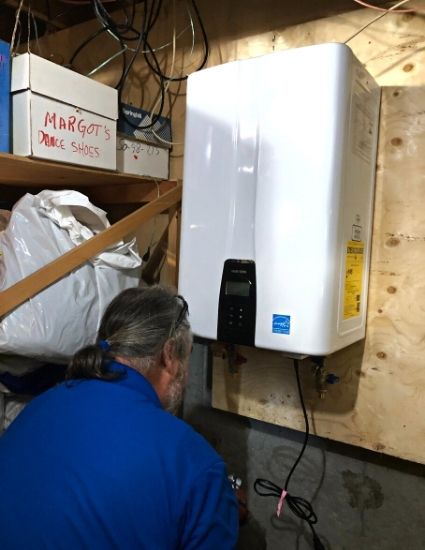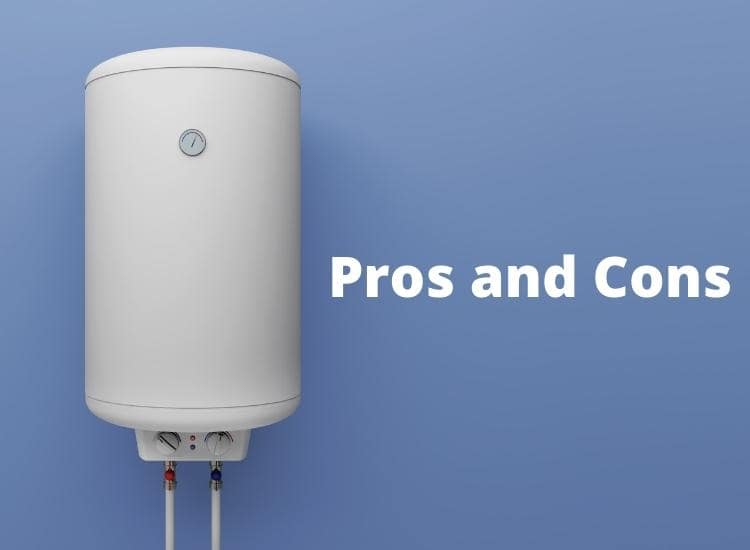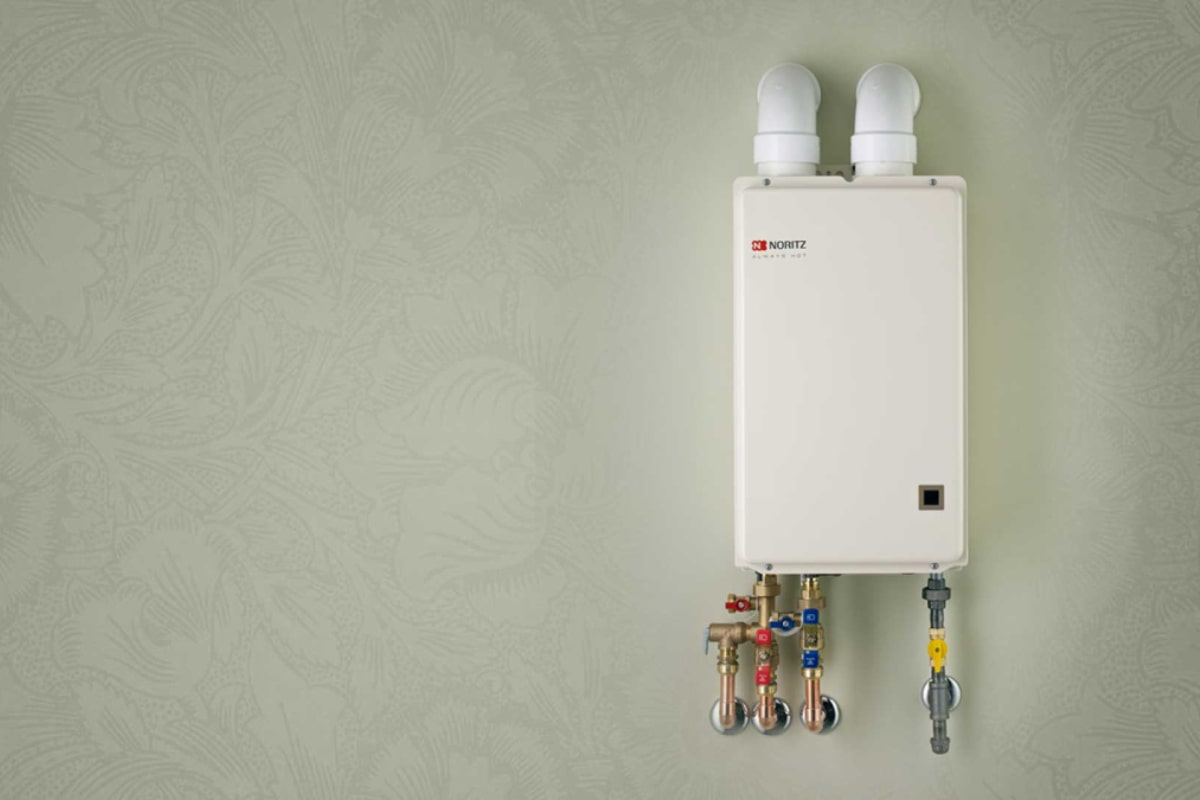The best tankless water heating systems heat cold water as it flows through the unit from your water supply line, and they don’t have storage tanks like traditional water heaters.
Are you on the fence about whether you should install a tankless water heater? This guide looks at the pros and cons of a tankless water heater to help you make an informed decision.
Table Of Contents:
Types of Tankless Units
If you’re considering a tankless water heater for your home, you should know about the types available (gas vs electric tankless water heaters, condensing vs non-condensing) and their pros and cons.
Invest in the one that best matches your home, needs, and preferences.
Gas Tankless Water Heaters
A gas tankless water heater runs on natural gas to heat the water. They’re usually more powerful than electric models.
They can provide more hot water at once, making them a good option for larger families or homes that use a lot of hot water.
They’re also more energy-efficient than electric heaters, especially in winter when it takes more energy to heat cold water.
On the downside, tankless heaters can cost more to install as they require a venting system. You’ll also need access to natural gas at your home.
Condensing vs. Non-Condensing Gas Heaters
There are two types of gas tankless water heaters to consider as well, condensing and non-condensing. They both heat water when you need it, but the way they heat water and vent exhaust gas is different.
- Condensing tankless water heaters capture and reuse the heat from exhaust gases that would otherwise be wasted in the heating process. After the water is heated, the exhaust gases are cooled, causing condensation. This heat from the condensation is then recycled to preheat incoming cold water, reducing the overall energy needed to heat the water. This results in greater energy efficiency and lower long-term energy costs, although they are more expensive upfront to install.
- Non-condensing tankless water heaters vent the hot exhaust gases directly outside after heating the water. Since the exhaust gases aren’t reused, the system isn’t as energy-efficient as a condensing unit. However, the technology is simpler and the units cost less upfront. Non-condensing units can still be quite efficient compared to traditional water heaters, but they tend to have higher operating costs in the long run due to the lost heat.
Electric Tankless Water Heaters
Electric tankless water heaters also heat water on demand, only powered by electricity. They’re usually more compact, easier to install, and cost less to install than gas models with no venting systems needed.
Older homes might require electrical panel upgrades. Tankless heaters do heat less water at once (lower flow rates) and can be a good option for one- or two-person homes.
They can also cost more to run, especially with electricity costs rising. They’re also an option if you don’t have access to natural gas or propane.
Tankless Water Heater Pros
Endless Hot Water
All tankless water heater models provide endless hot water. Never run out of hot water again! Great for homes with multiple hot water appliances, multiple showers, and large jacuzzi-style tubs.
Want to run your dishwasher, washer and shower at the same time? You can do that with a tankless water heater. What instant heat? Get a recirculating pump with your tankless water heater.
Hot Water on Demand (our Navien Models)

Our advanced Navien models, when installed with a NaviCirc valve give you truly instant hot water.
These tankless hot water systems start heating water when you open your warm-water faucet, which means you have an instant supply of hot water.
You don’t have to wait for the water in a storage tank to reach the right temperature. You also won’t run out of hot water.
Significant Energy Savings
The average family’s traditional tank water heater heats 56 gallons of water, which requires plenty of energy. However, you only heat the water you want to use with a tankless water heater, significantly reducing your household’s energy consumption. Over time, these energy savings can offset the heater’s initial installation costs. Tankless models offer over 94% efficiency. Also, make sure your water heater has the best sizing to ensure it’s working at the top performance.
Learn more about how a tankless water heater will save you money to help you decide.
Smaller Household Carbon Footprint
Your household’s fossil fuel consumption decreases because a tankless system only heats the water your family uses.
Long Functional Lifespan
On average, tankless water heaters last twice as long as traditional storage water heaters. A high-end water heater lasts around 20 years, and traditional systems have an economical and functional lifespan of around 10-12 years.
Small Home Solution
Tankless water heating systems are compact and don’t require large spaces for installation.
Increase Home Value
Investing in a tankless water heater can increase the resale value of your home. Homebuyers are drawn to more efficient homes, lower utility bills, and greener appliances.
Tankless water heaters are 24-34% more energy efficient than tank heaters. This is a great selling point for potential homeowners on a budget.
Another selling point is the long lifespan of tankless water heaters. They can last 20 years or more with proper maintenance. Add in the saved floor space and integrated smart features and you can see why tankless water heaters contribute to a higher home value.
Tankless Water Heater Cons
Higher Initial Costs
The purchase and installation costs of tankless water heating systems are higher than those of a traditional tank. However, you will recover the higher installation costs through energy savings over time.
Limited Flow Rate
The amount of hot water available at once (or flow rate) is limited in homes with tankless water heaters.
While they do provide an endless supply of hot water on demand, they can struggle to keep up if you have more than one family member taking showers at the same time.
If you have a larger family or often run more than one appliance that uses hot water, you may need to install more than one tankless hot water heater unit to keep up with demand.
Installation
Installing a tankless water heater is more complex and can cost more than a traditional storage water heater, especially if you have an older home.
Gas-powered units might need new gas lines and venting systems installed. Electric units may need an electrical upgrade. Tankless models also need to be professionally installed to be up to code.
Longer-term savings eventually make up for these higher installation costs, but it is something to consider.
More Frequent Maintenance
At Hot Water Ottawa,
we recommend servicing your tankless water heater once per year. Thorough inspection, cleaning, and flushing are crucial to extend your system’s lifespan and prevent inconvenient defects. Storage tank water heaters require less frequent maintenance.
Now you know the pros and cons of a tankless water heater. Compare Tankless vs Hybrid Water Heaters to help you decide if a tankless water heater is right for you.
Contact Hot Water Ottawa
At Hot Water Ottawa, we offer professional water heating solutions to property owners throughout Ottawa. We install water heaters from top brands and provide you with a complete repair or annual maintenance service.
To learn more about the pros and cons of a tankless water heater and determine if this system type is right for your home, contact us today at 613-729-5052.

